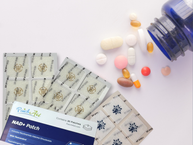“Eat a balanced diet, and you’ll be just fine.” That may be the word on the street, but is it true? It turns out that you may be able to benefit from having higher amounts of certain vitamins.
Your body needs 13 vitamins to stay healthy. These vitamins are in foods, and some people can theoretically get enough from the foods they eat. However, most people don’t meet their daily recommendations for all of the vitamins every day. Plus, there may be reasons to get more than the recommended amount of certain vitamins.* These are six vitamins that you could be low in, and how PatchAid Topical Patches can be an easy way to get more.
Vitamin D
Many Americans are low in vitamin D. That’s too bad, because vitamin D is involved in so many parts of the body. It’s known for its role in promoting bone health, such as through supporting calcium absorption and utilization. But vitamin D is also linked to lower risk for certain autoimmune disorders, such as type 1 diabetes, as well as some types of cancer, heart disease, and cognitive decline with aging.
Vitamin D is in a few different foods, though not a wide range. These are some sources.
- Vitamin D-fortified milk
- Orange juice, cereal, and milk substitutes that have vitamin D added
- Some brands of cheese and yogurt with added vitamin D
- Fatty fish
- Egg yolks
- Irradiated mushrooms
Widespread deficiency may be surprising because vitamin D is one of the vitamins that is not just available in food. Healthy people can make it when they get enough exposure to UV radiation from the sun, but there are many groups of people who are at risk for low levels of vitamin D. These are some examples.
- People who live in northern climates
- People who always wear sunscreen or cover their skin when they go outside
- Older adults
- People who do not eat dairy products
The Vitamin D3 with K2 Topical Patch and Vitamin D3 with Calcium Topical Patches are high in vitamin D.
Vitamin K
Vitamin K doesn’t get much attention except for in newborns, but everyone needs it. It is critical for normal blood clotting for starters. Without it, small bruises and cuts could lead to excessive bleeding. You also need vitamin K for heart health and bone health. Surprisingly, it is essential for calcium to be properly integrated into bone mineral. Vitamin K deficiency may also be linked to osteoarthritis.
Vitamin K sources are varied, but not everyone eats these types of foods in high enough quantities. Here are some examples.
- Kale, spinach, mustard greens, collard greens, and other greens
- Egg yolks
- Fermented foods, such as sauerkraut, natto, and kimchi
- Vegetable oils, such as rapeseed, sunflower, and soybean oils
- Beef and pork
- Cheese
People at risk for low vitamin K include those with malabsorption issues, such as some post-op bariatric surgery patients or people with IBD. People with high levels of vitamin A or E may also have trouble getting enough vitamin K.
The Vitamin D3 with K2 Topical Patch and Vitamin D3 with Calcium Topical Patches are high in vitamin K.
Vitamin B12
Vitamin B12 is one of the B vitamins that is essential for the production of healthy red blood cells. Healthy red blood cells carry oxygen to the cells in your body that need it. They also remove waste products from cells. Without enough healthy red blood cells, you may have a condition called anemia. Vitamin B12 is one possible cause of anemia. Vitamin B12 deficiency is also linked to neuropathy and heart problems, as well as risk for depression.
These are some sources of vitamin B12.
- Beef, pork, chicken, and turkey
- Fish and shellfish
- Egg yolks
- Milk, yogurt, and cheese
- Some fortified breakfast cereals
Vitamin B12 is only naturally found in animal-based products. That’s why people who eat a plant-based diet are at higher risk for vitamin B12 deficiency. Other individuals at risk are older adults, who may have trouble absorbing vitamin B12 from food, as well as bariatric surgery patients and other people with absorptive disorders.
The Vitamin B12 Energy Plus Patch by PatchAid is high in vitamin B12.
Folic Acid (Vitamin B9)
Folate, or folic acid when it is in supplements, is also known as vitamin B9. Like with vitamin B12, folate is required for the production of healthy red blood cells, and deficiency can cause anemia and symptoms such as fatigue and weakness. It is also needed for heart health and for preventing certain types of cancer, but the most common need for folate may be in the prevention of neural tube birth defects.
Folic acid is named for the Latin word for “leaf,” and sources include leafy foods. These are examples of sources of folate or folic acid.
- Asparagus
- Enriched grain products, such as rice, bread, and pasta
- Orange juice
- Lima beans
People at risk for low levels of folic acid include people with malabsorptive conditions and people who do not eat grain products. Pregnant and nursing women should ask their doctors about it.
The Vitamin B12 Energy Plus Patch by PatchAid is high in folic acid.
Vitamin C
Vitamin C is needed for iron absorption, as well as for proper immune system functioning. It is an antioxidant, which means that it can help prevent cells in your body from being harmed by chemicals called free radicals. You also need it for optimal heart health and for healthy skin and joints.
Vitamin C is in fruits and vegetables, with the following being examples of good sources.
- Citrus fruits, such as oranges and grapefruits
- Tomatoes
- Onions
- Bell peppers
- Spinach and kale
- Broccoli, cabbage, and cauliflower
- Cantaloupe
Outright vitamin C deficiency may not be common anymore, but many people believe in taking higher amounts.
The Vitamin C Plus Topical Patch has vitamin C, as well as antioxidants from herbal sources.
It is always good to ask your healthcare provider about your nutrient levels. Many can be checked with simple tests. If you are low or at suboptimal levels, your healthcare provider may be able to recommend one or more PatchAid topical patches to help.* Each of the above vitamins is also available in PatchAid’s Multivitamin Plus Patch with or without Iron.
*The Food and Drug Administration has not evaluated these statements. PatchAid products are not intended to diagnose, treat, cure or prevent any disease. Anyone with a medical condition should seek the advice of a licensed medical practitioner. Individual results may vary.







